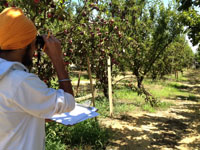
Heat related illness is a serious topic of concern for farm owners and farmworkers throughout CA. Each year there are hundreds of claims of heat related illness and a few agricultural worker fatalities. FHF recently hosted Diane Mitchell, a Staff Research Associate at UC Davis, Dept. of Public Health Sciences, who is coordinating a field study on heat illness in agriculture. Diane and her team spent a day in the orchard monitoring our Tree Team.
In the morning before the Tree Team headed out to the orchard for work, they took an FDA approved pill that transmitted their internal temperature. While working their normal shift, the team members wore heart monitors and belts. The belts collect electronic signals emitted from the heat pill, as well as the data from the heart monitor. A heat pen was also worn which collects data on the ambient temperature and humidity.
The research group observed and recorded Tree Team activities every 15 minutes. They will use their observations to add context to the data collected from the technology listed above so that they can correlate spikes in heart rate and internal temperature with activity, ambient heat and humidity, and factors such as if the crew was under canopy or in direct sun.
In addition to the heart, climate, and internal temperature data, the research group is collecting information on personal factors of farmer workers observed. They look at how much water is being consumed and how frequently, how much sleep they are getting, and what their diets are to further inform their study. Next year, the research group will conduct focus groups with workers and farmers to dive more deeply into the social and cultural factors of what effects workers decisions about water intake and other factors related to heat illness.
There are blanket rules and regulations set by OSHA in regards to farmworker heat illness and safety. However, these rules don’t take into account the various conditions that farmworkers are exposed to in CA. The variation in CA climate and the diversity of crops farmed are not taken into consideration. The Davis study is working with six CA farms to observe results from low growing crops like melons and cucumbers, to mid growing crops like grapes and tomatoes, to taller crops like orchard crops. A diversity of geography is also being observed. In tandem with Brentwood, the research group will observe orchard workers in the Central Valley.
Researchers hope to collect data that can help provide information on what combination of factors put farm workers at risk. FHF is pleased to be a part of the study to try and create better regulations and educational suggestions for farm worker health and safety.

 Follow
Follow
